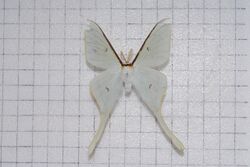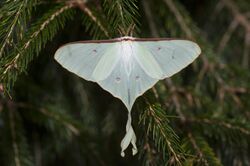Biology:Actias neidhoeferi
| Actias neidhoeferi | |
|---|---|

| |

| |
| Scientific classification | |
| Domain: | Eukaryota |
| Kingdom: | Animalia |
| Phylum: | Arthropoda |
| Class: | Insecta |
| Order: | Lepidoptera |
| Family: | Saturniidae |
| Genus: | Actias |
| Species: | A. neidhoeferi
|
| Binomial name | |
| Actias neidhoeferi Ong et Yu, 1968
| |
| Synonyms | |
| |
Actias neidhoederi is a moth belonging to the Actias Leach of Saturniidae. It is a species endemic to Taiwan.[1]。
Discovery
The species Actias neidhoederi was described by the local Taiwanese Sheng-Keng Ong and Ching-Chin Yu in 1968.[2] It is believed that they were the first two Taiwanese to describe a new species of moth. The publication of this species is based on several specimens collected from the Neng-gao Mountain area, Nantou. The male holotype is deposited at the Carnegie Museums of Pittsburgh in the United States, while five paratype male specimens and one allotype female specimen are deposited at the Milwaukee Public Museum in the United States .
Origins of the name
Another name for this species is neidhoeferi. This name was given by the primary author to James R. Neidhoefer, an active researcher of Samia cynthia, insect collector and trader, to commemorate the profound friendship that binds us across the Pacific.[2]
Originally, the Chinese name of this species, in Taiwanese publications, was “木生長尾水青蛾”, but the scientific name is not associated with “Yu Musheng” or “Musheng Insect Museum.” In recent years, it has been referred to as “姬長尾水青蛾” in published works[3],, describing it as relatively smaller compared to the other two lower-altitude species of the genus Actias in Taiwan. This publication garnered significant attention from Japanese collectors and researchers, who were enthusiastic about exploring Taiwan's insect fauna at the time. In 1970 and 1972,[4][5] Tamotsu Miyata, a Japanese researcher, supplemented further morphological descriptions of this species, which was considered extremely rare at the time, through two articles. It took 45 years from the first description of this new species for Hsu-Hong Lin and others to publish a complete description of its life cycle, in 2013, documenting for the first time that its larvae feed on Taiwan Fir and Taiwan Hemlock, making it a representative moth species of Taiwan's high mountains.[6]
References
- ↑ Shih, Li-Chen; Owada, Mamoru; Fu, Chien-Ming; Lin, Hsu-Hong. Moths of Nanheng Part 1: Saturniidae. Nantou: Endemic Species Research Institute. pp. 513–522.
- ↑ Jump up to: 2.0 2.1 Ong, S. K.; Yu, C. K.. "Description of Actias neidhoeferi (Saturniidae)". Milwaukee Public Museum, Occasional Papers-Natural History 1: 10–11.
- ↑ Peigler, R. S.; H. Y., Wang (1996). Saturniid moths of southeastern asia [東南亞王蛾科圖鑑]. The Taiwan Museum, Taipei. 262 pp.. Taipei: The Taiwan Museum. pp. 1–262.
- ↑ Miyata, Tamotsu (1970). "On Actias neidhoeferi Ong & Yu from Taiwan (Saturniidae)". Japan Heterocerists' Journal 62: 28–29.
- ↑ Miyata, Tamotsu (1972). "On the female of Actias neidhoeferi Ong & Yu from Taiwan (Saturniidae).". Japan Heterocerists' Journal 68: 127.
- ↑ Lin, Hsu-Hong; Shih, Li-Chen; Owada, Mamoru; Fu, Chien-Ming (2013). Moths of Hehuanshan: Saturniidae. Nantou: Endemic Species Research Institute. pp. 245-248, pl. 20: 4-8; 21: 1-11; 22: 1-2.
Wikidata ☰ Q1759879 entry
 |

